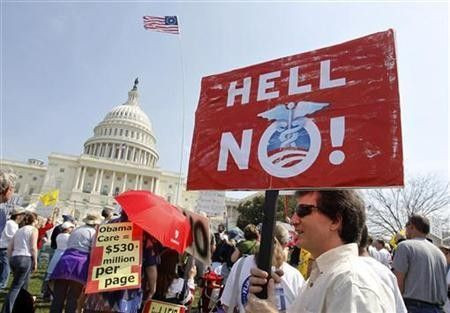Is Obamacare Really Collapsing? Debate Rages Over Health Care Reform

Amid a raging debate over health care reforms, Republicans tried to push the American Health Care Act (AHCA) Monday following a 10-day recess. The House remained divided over the GOP health bill that includes deep Medicaid tax cuts. Democrats have argued the tax cuts would benefit the rich.
GOP’s main argument to replace Obamacare has been the Affordable Care Act (ACA) is collapsing.
However, a new report released Monday revealed former President Barack Obama’s signature legislation is getting healthier.
The markets have stabilized in the first quarter this year and insurers have generally remained profitable, the report highlighted. “Loss ratios began to decline in 2016, suggesting improved financial performance. In 2017, following relatively large premium increases, individual market insurers saw significant improvement in loss ratios, averaging 75% in the first quarter,” the study by non-profit organization Kaiser said.
The non-profit organization focuses on national health issues, as well as the role of the U.S. in global health policy, according to its official website.
Read: Republican Health Care Plan: Trumpcare Gives Wealthiest 1% A $31B Taxcut
In its earlier analysis, the organization reported several insurance companies participating in the individual market experienced losses in the early years of Obamacare. The insurers had very little information to work with in setting their premiums which probably led to the losses. According to the analysis, the success of the ACA depended on the participation of private insurers in marketplaces, who will need to be profitable over the long-term to remain in the market.
Predicting future trends, the authors of the report – Cynthia Cox and Larry Levitt – said the uncertainty looming over health care policy will impact the market. “Mixed signals from the Administration and Congress as to whether cost sharing subsidy payments will continue or whether the individual mandate will be enforced have led to some insurers to leave the market or request larger premium increases than they would otherwise. A few parts of the country may now be at risk of having no insurer on exchange, though new entrants or expanding insurers have moved in to cover most areas previously thought to be at risk of being bare,” the authors said in the latest analysis that used financial data reported by insurance companies to the National Association of Insurance Commissioners.
The Republican health care bill has split the conservatives and moderates over various issues including tax cuts and insurance cover. While the GOP and the Democrats remain at loggerheads over proposed repeal of Obamacare, even the Republican Party members are not on the same page. Sen. John Hoeven (R-North Dakota) recently came out against the bill. In a statement released July 7, he said, “Premiums and deductibles in North Dakota and across the nation continue to rise and some areas of the country will be left with little or no insurer competition next year. That is why we’re working to reform our health care system." Another GOP member, Sen. Susan Collins (R-Maine) said last week she planned to vote against the bill.
Meanwhile, Sen. Ted Cruz (R-Texas) has been trying to push for an alternate plan to let insurers offer plans that Obamacare does not have. He has repeatedly asserted “failure is not an option” for Trumpcare.
Read: Is Obamacare Good For Jobs?
Loss of insurance cover for millions has been one of the concerns cited by moderates referring to the all-Republican health care bill. In June, the non-partisan Congressional Budget Office said an estimated 22 million people would lose coverage in over a decade under the Senate Bill. Most of that increase would stem from repealing the penalties associated with the individual mandate, the CBO said.
However, nearly two million Americans have lost health coverage even under the current law, a report published Monday by the Gallup-Sharecare Well-Being Index said. “The percentage of U.S. adults without health insurance grew in the second quarter of 2017 to 11.7%, up from 11.3% in the first quarter. The uninsured rate, measured by Gallup and Sharecare since 2008, had reached a record low of 10.9% in the third and fourth quarters of 2016,” the report said.
Reflecting on the reasons, the survey said: "Rising insurance premiums could be causing some Americans to forgo insurance, especially those who fail to qualify for federal subsidies.”
As the deadlock continues, President Donald Trump yet again urged Congress Monday to pass the AHCA.
© Copyright IBTimes 2025. All rights reserved.





















